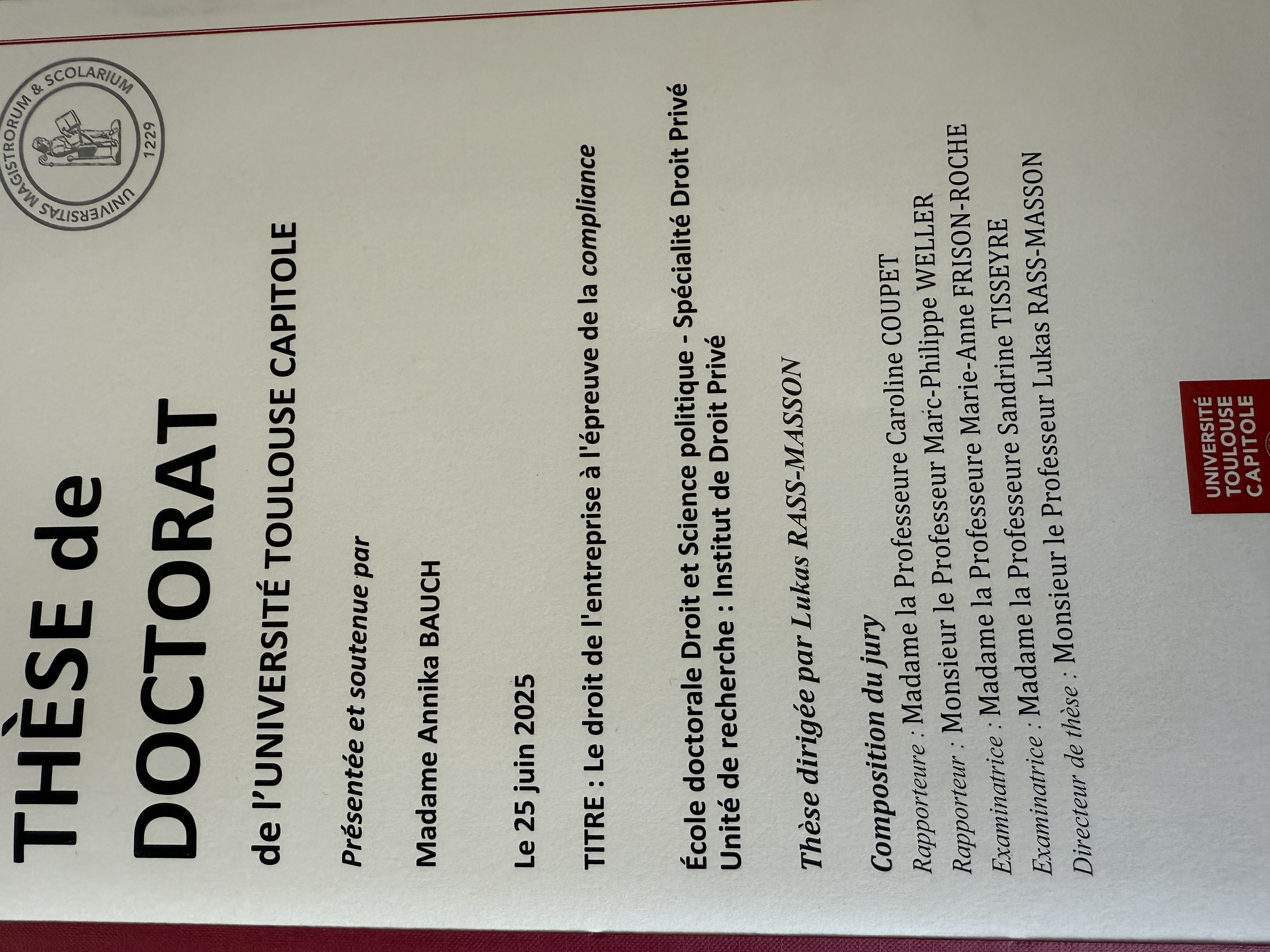The recent news
Aug. 20, 2025
Editorial responsibilities : Direction of the collection "Cours-Série Droit privé", Editions Dalloz (33)
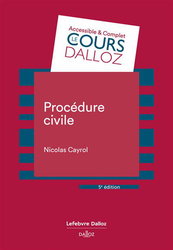
►Référence complète : N. Cayrol, Procédure civile, 5ème éd., Coll. "Cours Dalloz-Série Droit privé", Dalloz, 2025, 569 p.
____
►Présentation de l'ouvrage : L'étude de la procédure civile est indispensable à tous les étudiants désireux d'embrasser une « carrière judiciaire » : magistrat, avocat, huissier, etc. Par nombre d'aspects, la procédure civile est bien, en effet, un droit professionnel, un droit à l'usage des professionnels du procès. La matière figure d'ailleurs aux épreuves des concours et examens d'accès à ces professions.
Mais la procédure civile n'est pas seulement un droit professionnel : elle traite de problèmes qui intéressent tous les juristes, quels qu'ils soient, qu'ils pratiquent ou non la procédure. La connaissance des notions procédurales de base est nécessaire pour la bonne compréhension de nombreuses questions de droit.
___
📚Voir l'ensemble des ouvrages de la même collection "Cours Dalloz -Série Droit privé", créée et dirigée par Marie-Anne Frison-Roche,
et notamment ceux qui traitent des branches du Droit interférant avec la Procédure civile :
📕 Procédures civiles d'exécution
📕 Institutions juridictionnelles
_______
Aug. 20, 2025
Editorial responsibilities : Direction of the collection "Cours-Série Droit privé", Editions Dalloz (33)
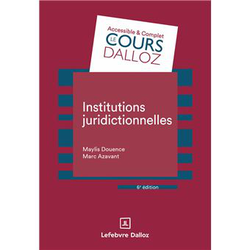
► Référence complète : M. Douence et M. Azavant, Institutions juridictionnelles, 1ière éd. 2010, 6ième éd. 2025, Coll. "Cours Dalloz-Série Droit privé", Dalloz, 2025, 425 p.
____
►Présentation de l'ouvrage : La nouvelle édition de cet ouvrage expose les "Institutions juridictionnelles", expression qui a remplacé heureusement celle "d'Institutions judiciaires", c'est-à-dire les principes, les structures et les personnes qui permettent la réalisation de la mission de trancher les litiges et de dire le droit. Sont ainsi analysés la justice administrative et judiciaire, les juridictions et les acteurs que sont les magistrats et les auxiliaires de justice, notamment les avocats.
L'ouvrage est destiné aux étudiants et à ceux qui préparent des concours administratifs ou par exemple l'examen d'entrée aux Écoles de formation des Barreaux.
____
📚 Dans la même collection, il s'articule avec les ouvrages de :
____
📚 Voir l'ensemble des ouvrages de la même collection 📎"Cours Dalloz -Série Droit privé"
________

Aug. 15, 2025
Publications

🌐Follow Marie-Anne Frison-Roche on LinkedIn
🌐Subscribe to the Newsletter MAFR Regulation, Compliance, Law
🌐Subscribe to the video newsletter MAFR Overhang
____
 ► Full reference : M.-A. Frison-Roche, The role of Discretionary Jurisdictio in the judicial treatment of Compliance cases, working paper, August 2025.
► Full reference : M.-A. Frison-Roche, The role of Discretionary Jurisdictio in the judicial treatment of Compliance cases, working paper, August 2025.
____
📗This working document was prepared as a contribution to the collective book offered to Professor Dominique d'Ambra, to be published and given to her in October 2026.
____
► Summary of the working document : Based on the definition of Judicial Office, the procedural principles that derive from it and the consequent powers that judges exercise, the objet of this study is to measure the degree of discretion that exists in the judicial treatment of compliance, without direct consideration for the dispute between litigants. This part is very ignored, when it should be given top priority. Indeed, because Systems are involved in compliance cases brought before civil or commercial judges, we are seeing a development of this discretionary element in judicial fonction. Discretionary matters differ from unilateral discretionary procedures, and this discretionary element relates to what the judge examines, possibly in the context of a dispute.
The first part of this contribution therefore aims to describe the natural development of the discretionary power of the judge to deal with compliance cases brought before them. This role stems from the fact that, even when triggered by a dispute, what is submitted to the judge is a situation composed of a system, which cannot defend its interests before the civil or commercial judge in this Systemic Litigation arising from the very nature of Compliance Law and the Compliance Obligations it engenders on systemic entites. Moreover, it is the Future whose interests must be considered and protected, which the judge must do directly.
This leads to the second part of the contribution, calling for a rethinking of the procedure and the role of the Compliance Judge, so that ex gratia matters can be dealt with. The judge must therefore verify that there are no conflicts of interest between the litigants, including hidden ones, and must learn about the systems involved. The inquisitorial principle must therefore be strengthened. But at the same time, since the primary aim is not to settle a dispute but to resolve a systemic problematic situation, the judge must facilitate the movements of the parties, and the adversarial principle must also be strengthened. Must be encouraged this activation of a powerful and discretionary approach, not as an exception but as a principle fully articulated with a contentious principle, with the dispute being only a means used by the necessary parties to enable systemic compliance situations to be resolved.
________
Aug. 3, 2025
Law by Illustrations

🌐suivre Marie-Anne Frison-Roche sur LinkedIn
🌐s'abonner à la Newsletter MAFR Regulation, Compliance, Law
🌐s'abonner à la Newsletter en vidéo MAFR Surplomb
► Référence complète : M.-A. Frison-Roche, "A côté d'𝑬𝒎𝒊𝒍𝒊𝒂 𝑷𝒆𝒓𝒆𝒛, quels principes guident l'Avocate ?", article de la Newsletter Droit & Art, août 2025.
____
___
► Résumé de l'article : Dans le film de Jacques Audiard sorti en 2024, le personnage de l'Avocate ouvre et clôture le film.Si l'on centre son regard sur elle, l'on observera qu'elle est choisie par le client parce qu'elle a la capacité à lui procurer dans l'ombre et sans souci du Droit ce qu'il veut. La corruption étant un système qui lui est familier. Cette conception d'un office où le Droit a peu de place la conduit à s'opposer au conseil donné par le médecin. Ainsi à de nombreuses reprises elle exprime sa désapprobation, morale et sociale, pour ce qui se passe et qu'elle connait avec précision, mais cela ne modifie en rien son comportement.Plutôt que de suivre ici les décisions, les tourments, l'identité, le rapport au passé du criminel, concentrons le regard sur la professionnelle qui ouvre et clôt le film : l'avocate. Regardons plutôt les décisions successives de cette avocate, la représentation qui est donnée ce que l'avocat doit faire ou ne pas faire.
Il s'agit donc d'une avocate qui est choisie par ce client pour une qualité : sa capacité à donner dans l'ombre satisfaction à un client qui, au regard du Droit, ne le mérite pas (I). Un criminel avéré, chef d'un réseau de trafic de drogue, la choisit pour une activité où le secret doit être absolu et la dimension juridique peu présente. Dans les démarches dont elle est chargée, elle est confrontée à un médecin, qui ne développe pas la même conception qu'elle et lui conseille de conseiller à son client de ne pas persévérer (II). Dans son âme et conscience, elle désapprouve la corruption qui structure l'ensemble de la société et dont elle semble tout savoir, mais cela ne modifie pas son comportement (III). Pourtant in fine et sans qu'on l'y oblige elle prendra dans une image finale soin des enfants devenus soudainement orphelins (IV).
____
lire l'article complet ci-dessous

Updated: July 25, 2025 (Initial publication: March 6, 2024)
Publications

🌐follow Marie-Anne Frison-Roche on LinkedIn
🌐subscribe to the Newsletter MAFR Regulation, Compliance, Law
🌐subscribe to the video Newsletter MAFR Surplomb
____
 ► Full Reference: M.-A. Frison-Roche, Compliance Obligation: build a compliance structure producing credible effects in the perspective of the Monumental Goals targeted by the Legislator, Working Paper, March 2024.
► Full Reference: M.-A. Frison-Roche, Compliance Obligation: build a compliance structure producing credible effects in the perspective of the Monumental Goals targeted by the Legislator, Working Paper, March 2024.
____
📝 This Working Paper is the basis of the article "Compliance Obligation: build a compliance structure producing credible effects in the perspective of the Monumental Goals targeted by the Legislator", in📘 Compliance 'Obligation de Compliance,
____
► Summary of this Working Paper: This article explains what companies' Compliance Obligation" is. Delving into the mass of compliance obligations, it uses the method of classification of those that are subject to an obligation of result and those that are subject to an obligation of means. It justifies the choice of this essential criterion, which changes the objects and the burden of proof of companies that are subject to an obligation of result when it comes to setting up "compliance structures" and are subject to an obligation of means when it comes to the effects produced by these compliance structures.
Indeed, this article goes on to analyse each body of regulations ("Sapins 2", "Vigilance", CSRD, CS3D, DSA, NIS2, DMA, DORA, AML-FT, ....) and the technical compliance obligations they impose, dividing them into obligations of result or obligations of means, depending on the text. This table of positive law thus drawn up, with reference to all the articles of the texts, shows that in positive law the Compliance Obligation has above all an evidential dimension, which is developed in the third part of the article: the company must show that it has put in place the compliance structures (obligations of result) required by the texts and it is up to third parties who criticise it for the unsatisfactory effects that these structures would have produced, according to them, to show that there is a fault or negligence on the part of the company (obligation of means).
Indeed, rather than getting bogged down in definitional disputes, given that Compliance Law is itself a nascent branch of Law, the idea of this contribution is to take as a starting point the different legal regimes of so many different compliance obligations to which laws and regulations subject large companies: sometimes they have to apply them to the letter and sometimes they are only sanctioned in the event of fault or negligence. This brings us back to the distinction between obligations of result and obligations of means.
Although it would be risky to transpose the expression and regime of contractual obligations to legal obligations put by legislation, starting from this observation in the evidentiary system of compliance of a plurality of obligations of means and of result, depending on whether it is a question of this or that technical compliance obligation, we must first classify them. It would then appear that this plurality will not constitute a definitive obstacle to the constitution of a single definition of the Compliance Obligation. On the contrary, it makes it possible to clarify the situation, to trace the paths through what is so often described as a legal jumble, an unmanageable "mass of regulations".
Indeed, insofar as the company obliged under Compliance Law participates in the achievement of the Monumental Goals on which this is normatively based, a legal obligation which may be relayed by contract or even by ethics, it can only be an obligation of means, by virtue of this very teleological nature and the scale of the goals targeted, for example the happy outcome of the climate crisis which is beginning or the desired effective equality between human beings. This established principle leaves room for the fact that the behaviour required is marked out by processes put in place by structured tools, most often legally described, for example the establishment of a vigilance plan or regularly organised training courses (effectiveness), are obligations of result, while the positive effects produced by this plan or these training courses (effaciety) are obligations of means. This is even more the case when the Goal is to transform the system as a whole, i.e. to ensure that the system is solidly based, that there is a culture of equality, and that everyone respects everyone else, all of which come under the heading of efficiency.
The Compliance Obligation thus appears unified because, gradually, and whatever the various compliance obligations in question, their intensity or their sector, its structural process prerequisites are first and foremost structures to be established which the Law, through the Judge in particular, will require to be put in place but will not require anything more, whereas striving towards the achievement of the aforementioned Monumental Goals will be an obligation of means, which may seem lighter, but corresponds to an immeasurable ambition, commensurate with these Goals. In addition, because these structures (alert mechanisms, training, audits, contracts and clauses, etc.) have real meaning if they are to produce effects and behaviours that lead to changes converging towards the Monumental Goals, it is the obligations of means that are most important and not the obligations of result. The judge must also take this into account.
Finally, the Compliance Obligation, which therefore consists of this interweaving of multiple compliance obligations of result and means of using the entreprise's position, ultimately Goals at system efficiency, in Europe at system civilisation, for which companies must show not so much that they have followed the processes correctly (result) but that this has produced effects that converge with the Goals sought by the legislator (effects produced according to a credible trajectory). This is how a crucial company, responsible Ex Ante, should organise itself and behave.
___
🔓read the developments below⤵️
July 2, 2025
Conferences

🌐follow Marie-Anne Frison-Roche on LinkedIn
🌐subscribe to the Newsletter MAFR Regulation, Compliance, Law
🌐subscribe to the Video Newsletter MAFR Surplomb
🌐subscribe to the Newsletter MaFR Droit & Art
____
► Full Reference: M.-A. Frison-Roche, "L'enjeu de la crédibilité des rapports de durabilité. Temps long, Simplicité et Stratégie" (The credibility of sustainability reports. Time, Simplicity and Strategy), concluding speech, in Rencontres de la Haute Autorité de l'Audit (H2A), 2025, Mise en œuvre de la directive CSRD. Premiers constats et perspectives (Annual Manifestation of the French Audit Regulatory Body Haute Autorité de l'Audit - H2A, Implementation of the CSRD directive. Initial findings and outlook),, 2 July 2025, La Défense, 1pm-6pm
____
This manifestation, which takes place face-to-face with simultaneous translation, begins with a presentation by Florence Peybernès, President of the French High Audit Authority ( Haute Autorité de l'Audit -H2A).
It is followed by 3 round-table discussions:
🪑🪑🪑 Round table 1: Feedback on the first appointments
🪑🪑🪑 Round table 2: Cross-perspectives between preparers, verifiers and stakeholders
🪑🪑🪑 Round table 3: Perspectives for CSRD
It is following on from this that the more legal, more judicial perspective, in an articulation between Ex Ante and Ex Post, will take shape.
____
► English summary of the speech, as prepared : n view of the information available at the time of preparation for this event, the considerable interest aroused by the CSRD, and also its contestation, which led to its modification, is it counter-intuitive in view of the technicality of the remarks, the flood of criticism and the number of pages one reads, the impression of the weight, constraints and uselessness of the thing which would deprive companies of their freedom, but what emerges rather is Simplicity. Why: because the sustainability report is only a tool and it is the goal it serves that needs to be considered (more generally that's how the judge looks at it), a tool that serves a European strategy (Green Deal, sustainable finance). It is this strategy that needs to be identified, and the company has a free hand in it. What we are looking at the company in its contribution to this goal that is simple, a contribution which it can, in information that is admittedly standardised, draw the outlines of
Long-term and Strategy: Investors and stakeholders are not hostile to this approach: the key is the credibility of the information made available. Because Long-Term Thinking puts the future at the centre, and we don't know what that future will be. This essential element, which the courts have recalled in relation to Vigilance Obligation, must also be borne in mind, because it is first and foremost a question of providing information about the future.
To express the Information they want to give on this subject, companies need to understand the Goal of the European Plan (where Simplicity lies), to adjust their own plan to it (under the more familiar term of "Strategy") the councils and lawyers need to help them with this; to blend their strategies with the European strategy, to rely on the authorities and the auditors so that what they say is credible. Credibility is at the heart of it, which is why auditors are at the heart of it.
Because the only obligation they have is to say. Not to do. The CSRD should not be interpreted as imposing obligations on the companies subject to it to do things (such as the obligation of vigilance generates); the CSRD only imposes an obligation on them to say things. The CSRD imposes on them only an obligation to inform. While this may be onerous, standardised and certified, there is no obligation to do or disclose anything. Moreover, that is part of the company's own strategy, a strategy over which the company retains full control. In this respect, although standardised, the information is free and it is the credibility of the information that is crucial, but not participation in a plan whose terms would be written by the Authorities or the stakeholders.
Therefore, after learning from each other, it seems that there are three fairly simple things that are sometimes buried under the complication of the details accumulated and the violence of the arguments exchanged around the European Omnibus package. These three points will be developed at the end of the round-tables.
The first is the simplicity of the breadcrumb trail of credible, accessible information imposed by the European Union to put the Green Deal into practice. This breadcrumb trail is held in particular by the various regulators.
The second is the existence of a single, simple obligation on the part of the company: to say what it has done, is doing and plans to do, without being obliged to do anything in the European Action Plan (the CRSD does not forcibly enroll companies in the European action plan). This limitation to an obligation to say is essential. Its articulation with obligations to act, arising in particular from texts on Vigilance, or even identical terms, must not lead to confusion in qualifications.
The third is the benefit that the company derives from the articulation of a double "singular strategy": that of the European Union, which wants to build its future, a strategy of the Union to which it is free to contribute or not to contribute, and that of its own strategy which is articulated with the first and in which green gives way to many other colours according to the will of the company.
► English Summary of speech, as made with regard to what effectively was said during the 2 round tables: During the event itself, I preferred to place myself rather in the direct continuation of what had been said. In the fifteen minutes allotted, this was the reason for not proceeding in this way, but rather to highlight the fact that what has emerged, all these efforts, uncertainty, trial and error and goodwill to elaborate that went into drawing up the first sustainability reports, runs the risk of being erased because in retrospect, in 2 or 5 years' time, particularly if a lawsuit were be brought, we will have the impression that everything was self-evident, that we knew everything, that everything was clear and decided. And it's that future, which will be the future of the judge who will be called upon by a stakeholder, a regulator, a prosecutor, who always takes the past for granted, that we have to think about. We need to think in terms of evidence. Evidence of uncertainty. And always remember that the sustainability report is also a piece of evidence. Which will fuel liability claims, disputes over information, and so on.
Plus encore, parce que le report de durabilité n'est qu'un outil, pour une stratégie, qui est une stratégie d'ensemble, où la CSRD n'est qu'un élément du puzzle, des éléments du rapport de durabilité peuvent être pris pour être utilisés plus tard pour alimenter d'autres documents et rapports, et d'autres litiges. Cela est notamment le cas du plan de vigilance, puisque la cartographie des risques est souvent commune au rapport de durabilité et au plan de vigilance, ce qui est logique puisque la CSRD et la CS3D se font miroir dans le grand plan d'action de l'Union que constitue le Pacte vert. Mais cela est amplifié par les entreprises, qui parfois confondent l'un et l'autre, dans la présentation même au sein du rapport de gestion. Il est pourtant essentielle de distinguer nettement l'obligation de dire (rapport de durabilité) et l'obligation de faire (plan de vigilance). L'ambiguïté des "engagements" accroît cela. Il est essentiel de veiller à un travail ex ante entre expert de la gestion, de la finance, de l'audit et du droit pour éviter que les points de contact ne se transforment en confusions, maintenant et /ou plus tard, confusions qui pourraient être préjudiciables à tous.
________
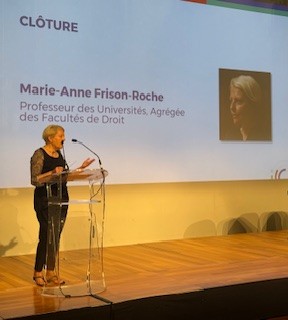
June 26, 2025
Editorial responsibilities : Direction of the collection "Cours-Série Droit privé", Editions Dalloz (33)
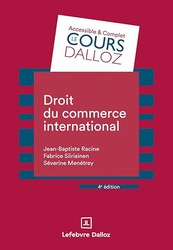
► Référence complète : J.B. Racine, F. Siiriairnen, S. Menétrey, Droit du commerce international, Dalloz, coll. "Cours Dalloz-Série Droit privé", 4ière éd., 2025, 410 p.
____
► Présentation de ce Cours : Ce Cours expose toutes les règles particulières du commerce international (vente, transport, distribution, etc.). Le droit du commerce international est devenu une discipline mise au cœur du processus de mondialisation de l'économie. Elle est donc en pleine expansion. Ce n'est pas seulement une branche du droit international privé.
Le droit du commerce international présente une autonomie certaine par son esprit, ses méthodes et son objet. Les sources de ce droit sont particulières dans la mesure où il fait la part belle aux usages du commerce international, plus généralement désignés sous l'appellation de lex mercatoria. Les acteurs du commerce international sont variés : il s'agit bien entendu des sociétés mais aussi des États . Le particularisme du droit du commerce international se situe aussi au stade des opérations du commerce international : la vente, le transport, la distribution, etc. obéissent à des règles particulières, le plus souvent des règles matérielles de source internationale. Enfin, l'importance et l'originalité du droit du commerce international se manifestent dans le recours à l'arbitrage. En tant que justice privée, l'arbitrage est aujourd'hui devenu le mode de résolution de droit commun des litiges du commerce international.
L'ouvrage s'adresse aux étudiants qui découvrent la matière ainsi qu'aux universitaires et praticiens. Il allie connaissances théoriques et orientations pratiques. Il ouvre sur une vision différente du droit, c'est-à-dire un droit partiellement dissocié de l'État. Il met aussi l'accent sur la nécessité de bâtir un droit répondant aux défis de la mondialisation.
____
📚Consulter l'ensemble de la collection dans laquelle l'ouvrage est publié
____
📚Sont directement corrélés à cet ouvrage :
🕴️B. Haftel, 📕Droit international privé
🕴️D. Mainguy, 📕Contrats spéciaux
________

June 25, 2025
Teachings : Participation à des jurys de thèses

🌐follow Marie-Anne Frison-Roche on LinkedIn
🌐subscribe to the Newsletter MAFR Regulation, Compliance, Law
🌐subscribe to the Video Newsletter MAFR Surplomb
🌐subscribe to the Newsletter MaFR Droit & Art
____
► Full Reference: M.-A. Frison-Roche, member of the jury for Annika Bauch's thesis, Le droit de l'entreprise à l'épreuve de la compliance (Company Law put to the test of Compliance), University of Toulouse, 5 June 2025, 2-5pm.
____
🪑🪑🪑Other members of the jury :
🕴🏻Lukas Rass-Masson, Professor at Toulouse-Capitole University, thesis supervisor
🕴🏻Sandrine Tisseyre, Professor at Toulouse-Capitole University,
🕴🏻Marc-Philippe Weller, Professor at the University of Heidelberg, Germany
🕴🏻Caroline Coupet, Professor at the Université Panthéon-Assas (Paris II)
____
► Presentation of the thesis: The thesis is based on French, American and German research. It is based on two perspectives.
The first part of the thesis describes the way in which Business Law feeds into Compliance, since it is within Business Law (and more particularly Company Law and the legal rules governing corporate bodies) that Compliance, which the author presented to have originated in the United States, has transformed the way in which companies must be managed, having to take into account the extra-financial dimension of their activity, which modifies the very notion of social interest and leads to the integration of stakeholders into the corporate functioning.
The second part of the thesis looks at the way in which Compliance has transformed Corporate Law, bringing with it new requirements, such as consideration of risks, regulatory mechanisms and ethical concerns, with the company itself becoming a vehicle for Compliance. This is achieved in particular by inserting compliance clauses into contracts, which is an appropriate but nevertheless limited tool for this compliance goal.
____
At the end of her defence, the candidate was awarded the degree of Doctor of Law and was informally congratulated by her jury on the quality of her work.
____
